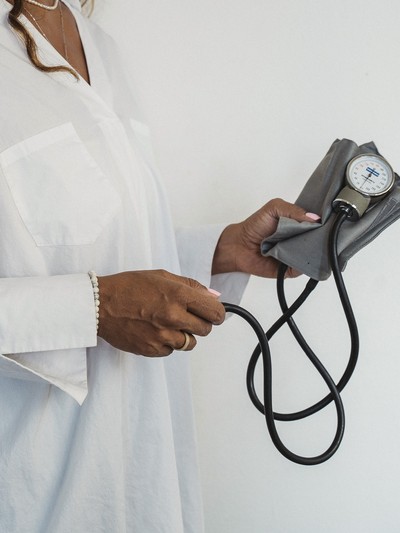

7 Ways To Reduce Your Stroke Risk
Get Moving
One of the simplest health tweaks you can make when it comes to reducing stroke risk is to move more. It doesn’t have to cost you anything, can easily be built into your day and has endless benefits, says Dr Steve Allder, consultant neurologist at Re:Cognition Health. “Exercise is one of the best things you can do for your brain and body. Exercise provides good blood flow to the brain and is thought to encourage brain cell growth and survival. It also helps lower high blood pressure and reduces cholesterol in the blood, slows the clogging of arteries and helps with other risk factors for stroke, such as obesity, high cholesterol and stabilising blood sugar.” Steve recommends aiming for moderate to vigorous exercise three to five times per week.
Quit Smoking
The dangers of smoking are well known, and there’s no exception when it comes to your stroke risk. “Smoking greatly increases your chances of having a stroke,” says Dr Angela Rai, GP at The London General Practice. “If you smoke 20 cigarettes a day, you are six times more likely to have a stroke. Tobacco contains harmful chemicals that damage cells in the body and increase LDL cholesterol levels (bad cholesterol) and reduces HDL, the beneficial form of cholesterol. Smoking also reduces the amount of oxygen in the blood, while nicotine makes your heart beat faster and increases blood pressure. Moreover, elevated cholesterol increases your risk of developing atherosclerosis, leading to the narrowing of your arteries, blocking blood flow. Smoking also increases the risk of clots.” If you are a smoker, it makes sense to quit. You can ask your GP to refer you to the free NHS Stop Smoking Service.
Deal With Stress
Stress causes the heart to work harder, increases blood pressure and raises sugar and fat levels in the blood. These, in turn, can increase the risk of clots forming, which can then travel to the heart or brain, causing a heart attack or stroke. Stress can also impact lifestyle decisions which also raise your stroke risk. “Comfort habits such as eating unhealthy food, drinking too much and smoking all damage heart health,” adds Professor Denis Kinane, immunologist and founding scientist at Cignpost. “If you turn to alcohol when stressed, get out of the habit; and drink no more than seven drinks a week, ideally one a day. Drinking in moderation – within these amounts – will also assist in weight loss and reduce blood pressure.” If you struggle to unwind, simply reading a book can be incredibly effective, says Dr Deborah Lee, GP at Dr Fox Online Pharmacy. “Reading a book for 30 minutes has been shown to increase life expectancy by 23 months, most likely because of its ability to lower stress,” she says.
Consider HRT
Women over 50 are at an increased risk of stroke, says Deborah. “Women are generally protected from atherosclerosis – the deposition of fatty plaques in the arteries – by oestrogen. Up until the menopause, women have a lower risk of cardiovascular disease than men. But after the menopause, for which the average age is 51, oestrogen levels fall and this protection is lost, hence our risk catches up with men. In women, a stroke may be the first sign of cardiovascular disease, whereas in men, this is often a heart attack.” If you are experiencing symptoms of low oestrogen, Deborah recommends considering HRT. “The best time to use HRT for optimal protective benefits is the time from the onset of menopausal symptoms for five to ten years,” she says. “However, if you are over 60 and want to start HRT, this may increase your risk and is generally inadvisable.”
Try The DASH Diet
We all know we should be eating more fibre and less meat, but Deborah says the DASH Diet is particularly interesting when it comes to reducing stroke risk. “Unlike most diets, the aim of the DASH Diet is to help people tackle high blood pressure and high cholesterol,” she tells us. It was discovered in the mid-90s and has soared in popularity in the US ever since. The diet is rich in fruit and vegetables, low-fat dairy products and whole grains, and low in red meat, animal fats, sugar and salt. “The results are impressive,” says Deborah. “Participants on the diet can reduce their blood pressure in as little as 14 days.” Cutting back on salt is also key, says Denis. “High levels of sodium elevate your blood pressure, contributing to increased risk of heart disease and stroke,” Denis warns. “The NHS guidelines suggest adults shouldn’t exceed 6g of salt per day, equivalent to one teaspoon. When cooking, try swapping salt for herbs and spices instead.”
Get Seven Hours Of Sleep
If you needed an excuse to get an early night, studies show the risk of a stroke is four times greater among individuals who sleep fewer than six hours a night compared to those who sleep seven to eight hours per night. However, there’s a sweet spot, says Deborah. “Studies show those who sleep more than nine hours a night have a 23% increased risk of stroke compared to those who get under eight hours of sleep. And if you nap, don’t nap for more than 30 minutes as napping for 90 minutes or more in the middle of the day increases stroke risk by 25%.”
Have Regular Checks
The Stroke Association recommends having your cholesterol and blood pressure checked regularly. This means a blood pressure check at least once a year and a cholesterol check at least every five years, or more frequently if advised by your GP. Deborah recommends having regular NHS health checks, a service that’s currently offered to adults aged 40 to 74. “As we get older, we have a higher risk of developing certain health conditions, and these free tests are designed to spot early signs of stroke as well as kidney disease, heart disease, type 2 diabetes and dementia.” You should receive a letter from your GP surgery or local council inviting you for a free NHS Health Check every five years. “When it comes to a stroke, the benefits of routine health checks can’t be overstated,” adds Denis. “Discovering a health problem early can help you make better informed decisions about your health, improve the likelihood of successful treatment and reduce the risk of stroke.”
For more information visit RecognitionHealth.com, TheLondonGeneralPractice.com, DoctorFox.co.uk and Cignpost.com
DISCLAIMER: Features published by SheerLuxe are not intended to treat, diagnose, cure or prevent any disease. Always seek the advice of your GP or another qualified healthcare provider for any questions you have regarding a medical condition, and before undertaking any diet, exercise or other health-related programme.
DISCLAIMER: We endeavour to always credit the correct original source of every image we use. If you think a credit may be incorrect, please contact us at info@sheerluxe.com.

